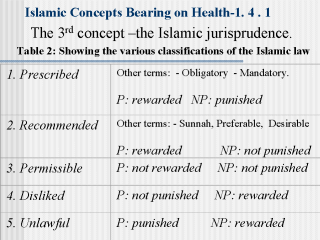| front |1 |2 |3 |4 |5 |6 |7 |8 |9 |10 |11 |12 |13 |14 |15 |16 |17 |18 |19 |20 |21 |22 |23 |24 |25 |26 |review |
 |
Islamic Jurisprudence relies on
the Quran first then the Ahadith. Its practice is mainly done by Muslim scholars versed in
the Quran, Ahadith and also the science of interpretation of these. The science of fiqh
started in the second century after Hijrah (Starting point of the Islamic calendar is the
migration of the prophet from Mecca to Medina known as the Hijrah), when the Islamic state
expanded and faced several issues, which were not explicitly covered in the Quran and
Ahadith of the Prophet . Rulings based on the unanimity of Muslim scholars (jurists) and
direct analogies are binding. These rulings are also commonly referred to as the Shariah
law. There are five classifications of rulings within the Islamic Jurisprudence. These are
‘prescribed’, ‘recommended’, ‘permissible’, ‘disliked’ and ‘unlawful’.
The distinctions between them are in whether their performance (P) and nonperformance (NP)
is rewarded, not rewarded, punished or not punished (see table 2 on slide). (MSA, 2002a) The prescribed (fard) is also referred to as obligatory (wajib), mandatory (muhattam) and required (lazim). It is divided into two categories: - Personally obligatory (fard al-'ayn), which is required from every individual Muslim (e.g. the five daily prayers and Zakat); - And communally obligatory (fard al- kifaya), which if performed by some Muslims is not required from others (e.g., funeral prayers). The recommended (mandub) is also referred to as sunnah, preferable (mustahabb), meritorious (fadila), and desirable (marghub fih). Examples are night vigil (tahajjud) prayers, and remembrance of Allah (dhikr). Example of the ‘permissible’ is marrying four wives, ‘disliked’ is divorce and ‘unlawful’ is alcohol. The performance and nonperformance of the permissible/ allowed (mubah) is neither rewarded nor punished. Nonperformance of both the disliked (makruh) and the unlawful/prohibited (haram ) is rewarded. Performance of the unlawful is punished, but that of the disliked is not punished. NB: Please go to website cited below for comprehensive details on this subject and a more detailed table on the Islamic laws classification. Reference: MSAa. (21st June 2002). Shari`ah and Fiqh. Muslim Student Association, University of Southern California. http://www.usc.edu/dept/MSA/law/shariahintroduction.html |
| front |1 |2 |3 |4 |5 |6 |7 |8 |9 |10 |11 |12 |13 |14 |15 |16 |17 |18 |19 |20 |21 |22 |23 |24 |25 |26 |review |